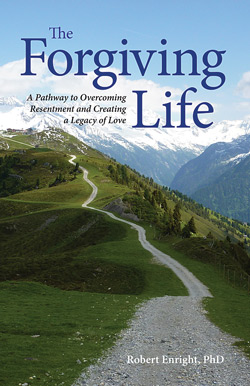Archive for May, 2017
Should I Forgive?
Excerpt from pages 37-38 of the book, The Forgiving Life by Dr. Robert Enright:
.
 Nietzsche said that only the weak forgive. In other words, if you have to keep a job, then you forgive. If you find another job, then you can boldly tell that boss where he can go as you strut out the door. Yet, is this philosopher Nietzsche talking about genuine forgiveness? I don’t think so.
Nietzsche said that only the weak forgive. In other words, if you have to keep a job, then you forgive. If you find another job, then you can boldly tell that boss where he can go as you strut out the door. Yet, is this philosopher Nietzsche talking about genuine forgiveness? I don’t think so.Richard Branson: F is for Forgiveness
Richard Branson is one of the world’s most prolific entrepreneurs. Since starting Virgin Records in London in 1970 (and selling it in 1992 for $1 billion), he has grown his Virgin Group brand into more than 60 Virgin companies worldwide, employing nearly 71,000 people in 35 countries.
Branson is the only person in the world to build eight billion dollar companies in eight different sectors. His current highest profile activity is Virgin Galactic, which is on track to become the world’s first privately funded commercial space line, and his SpaceX Interplanetary Transport System.
But after nearly 50 years of building companies, Branson says there is one attribute that is key to his success and that of his companies — forgiveness.
“One of the most important lessons I have ever learned is the power of forgiveness. Forgiveness has become a cultural policy within Virgin,” according to Branson. “We give second chances, and have reaped great rewards as a result. It’s amazing how much people lift their game when you put trust and hope in them.”
“My life and career could have been very different if I hadn’t chosen to forgive one of my very first business partners. After finding a note outlining his plans to oust me as Student magazine’s publisher and editor, I felt incredibly betrayed and we decided to part ways.”
From Student, Branson’s first business, came the idea for Virgin. But as the operation took off, Branson decided to let bygones be bygones and called up his former partner and asked him to re-join the team.
“Forgiving him was one of the best decisions I have ever made,” Branson said. “I retained a great friend, became happier at work and in life, and gained the confidence to grow Virgin. Forgiveness brought us both peace and success.”
According to Branson, one of his employees was caught stealing in the early days of Virgin Records. Instead of letting him go, Branson decided to forgive him and offer him a second chance. “And thankfully so,” Branson recalls, “as he went on to discover talent like Culture Club, Human League and Phil Collins and sign them to our music label.”
Citing another example, Branson says “Nelson Mandela’s life is a powerful tale of forgiveness. After being unfairly jailed for 27 years, he forgave the people who imprisoned him. This forgiveness enabled him to become one of the greatest leaders the world has ever seen. Together with Archbishop Desmond Tutu he set up the Truth and Reconciliation Commission after apartheid was abolished, and the spirit of forgiveness shown in the process continues to enable South Africa to move forward.”
Branson’s advice on forgiveness: “If you’ve fallen out with someone, I urge you to call them up and arrange to meet and talk about the situation. You’ll most likely both think that the other person is to blame, but give each other the benefit of the doubt. Life’s too short to hold grudges. Everyone deserves freedom to move forward – and forgiveness is the fastest route to peace and happiness.”
Branson is the world’s most followed person on LinkedIn. He maintains a daily blog on his virgin.com website discussing everything from entrepreneurship, conservation and sustainability to travel, music and humor. He has more than 11.5 million followers across five social networks and has also written six books, including his autobiography Losing My Virginity.
Read more:



